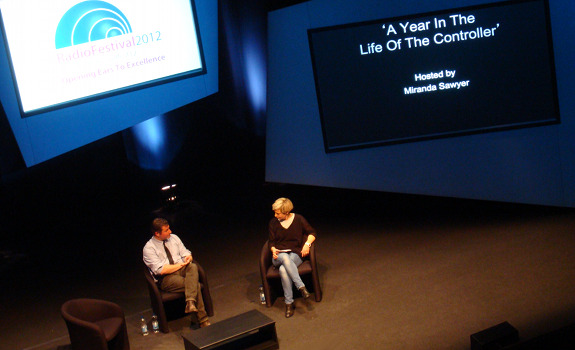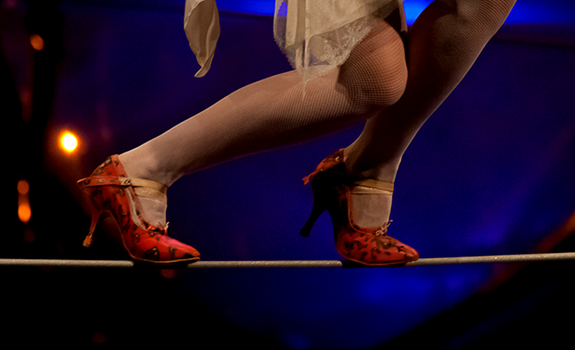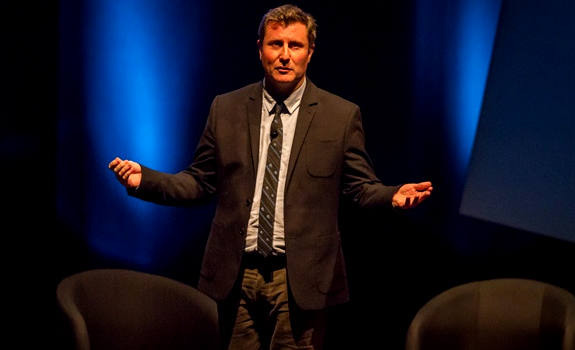BBC Radio 1 controller Ben Cooper sees a role for his public station to lead experiments and innovation, but emphasizes that dedication and quality still matter just as much.
“You still want to make brilliant radio; that’s the train that pulls the carriages”, Cooper said at the Radio Festival 2012 (see also part 1 and part 3). Innovation-wise, Radio 1 experiments with social and visual radio. They get help from user-generated and indie-created content that fits the plan to attract more young listeners – or more people of a certain culture.
“We are different people with different attitudes,
and that could be the way forward”

BBC Radio 1 controller Ben Cooper (on stage with session host Miranda Sawyer) thinks that focusing on lifestyle groups instead of audience demographics might be a new way of defining radio formats (photo: Thomas Giger)
Create full multimedia experience
BBC Radio 1 wants to lower the average listener age from 33 to under 30 years. To achieve this, controller Ben Cooper wants to refer the lifestyle demographic of Trendy Adults to other BBC stations, and attract a younger audience of Smartphone Teens. Radio 1 will tailor its schedule, music and events towards young people and present audio, video and social media content under one multimedia brand that invites the audience to listen, watch, and share. British writer and broadcaster Miranda Sawyer interviewed Cooper on stage after his presentation, and asked whether this age target isn’t a mission impossible. “I think that age is completely irrelevant when it comes to music”, she says, using BBC Radio 1 presenters such as Pete Tong (1960) and Annie Nightingale (1940!) as examples of people who are still in touch with today’s pop culture.
 Develop lifestyle-based radio formats
Develop lifestyle-based radio formats
Cooper realizes “there is a part of society that just loves new music and will not move from Radio 1”, just like “there are some 21-year-olds who love listening to Heart, and don’t want to be challenged by drum ‘n bass.” When it’s impossible to get the average age under 30, he’d ask the BBC Trust to define BBC Radio formats based on people’s attitudes instead of (mostly) their age. “We are different people with different attitudes, and that could be the way forward.”
Broadcast user-generated video content
An important part of ‘listen, watch, share’ is making radio visible on mobile devices. While she finds the Live Lounge “an absolutely classic example” of visualization, Sawyer is not really a fan of The Official Chart in this respect. “Why bother with rubbish videos that you can get on YouTube anyway?”, she’s asking in witty tone. Cooper agrees that playing videos of chart songs to visualize a Top 40 countdown is not really creative, but says they’re trying out new stuff. Radio 1 wants to turn the last hour into a TV-alike experience and include listener-generated videos and self-produced movies that are inspired by current chart hits. The show would still play music videos of (especially new) songs, but also show that other video footage.
“Radio 1 always has to walk this tightrope in high heels”

Ben Cooper points out that as a public broadcasting station, BBC Radio 1 constantly has to balance between being popular and being progressive (photo: Rose Joy Kivellote / Alternavox Magazine)
Balance familiarity and identity
Another assumption of the interviewer is that the station sometimes is “guilty of playing stuff to listeners that they already like” – in other words, playing not enough new, unknown or different music. “Radio 1 always has to walk this tightrope in high heels”, Cooper replies. He always tries to find the optimal balance between sounding familiar and being distinct enough from what’s happening in the rest of the market; especially in commercial radio. He adds that the BBC Trust laid down specific percentages for the music that BBC Radio 1 has to play, which is 45% new music (“we actually play about 50%”) and 40% UK artists.
 Feature socially relevant content
Feature socially relevant content
As a public broadcaster, BBC Radio 1 wants to be more than just a music station. It also features stories about audience-relevant topics. “We’re being much more challenging with some of the content and the stories that we’re telling in our documentaries now”, Ben Cooper says. Recently the station addressed domestic violence among teenage relationships, and it had teenagers meet with convicted people in prisons.
Invite independent radio producers
BBC Radio 1 wants to be open for independent radio producers with good ideas for content, and offer them a chance (and a budget) to create it. The controller advises independent journalists and documentary producers to just contact the station directly when they have a brilliant idea, and not necessarily wait until the next commissioning round. He says it helps a lot if indies clearly show in their proposal that they understand the station’s multimedia (listen, watch, share) strategy, if they have a feeling for its target audience. When the idea offers a way to attract more young listeners to the station, that would be a big plus as well.
“We have got to evolve,
otherwise we’re going to be dinosaurs”

Ben Cooper sees BBC Radio 1 as the ideal test platform for digital radio innovation (photo: The Radio Academy)
Contribute to radio innovation
In terms of the declined Time Spent Listening to BBC Radio 1 from 8 to 7½ hours a week on average, Cooper notes “there are so many more distractions in the world, and a lot of them are on your phone in your pocket”. BIn his opinion, BBC Radio 1 should be a leader of digital innovation, which can be good for the whole radio industry. “The license fee is almost seed capital; it’s the opportunity to try things out. The young audiences today will be the audiences of Radio 2, Radio 4 and Heart down the line. We have got to evolve, otherwise we’re going to be dinosaurs.” But he believes that the basics will remain the same: “You still want to get up in the morning and tell those funny anecdotes, or interview those people, or play those songs that no one else is playing. You still want make brilliant radio; that’s the train that pulls the carriages.”
Read also:
- “Radio Is Dead, Long Live Radio”
- Coaching Talents Is “Like Being A Psychiatrist”
- Programming (related articles)
Stay tuned, follow us @RadioILOVEIT and click below to share this post:





Add Your Comment